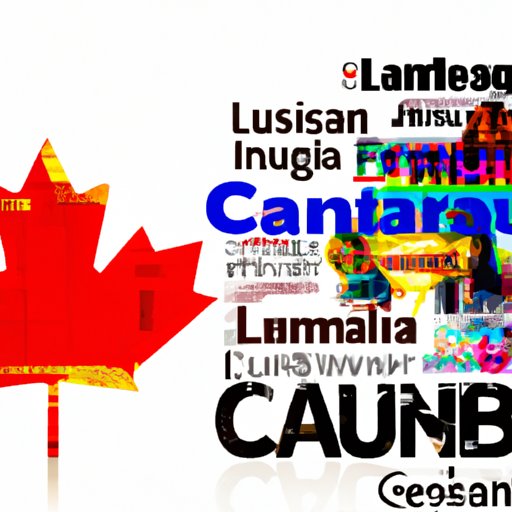Introduction
Canada is a country of diverse cultures, languages, and religions. From the Inuit and First Nations peoples to recent immigrants from around the world, each group has contributed to the unique cultural mosaic that makes up modern-day Canada. This article explores the different cultural groups in Canada and how they influence Canadian culture, as well as the history of multiculturalism and the impact of globalization on Canadian society.

Exploring the Different Cultural Groups in Canada
The diversity of ethnic groups in Canada is one of the defining characteristics of its national identity. According to Statistics Canada, the most commonly reported ethnic origins in the 2016 census were Canadian, English, French, Scottish, Irish, German, Chinese, Italian, and First Nations. These are just a few of the many cultural backgrounds that can be found in Canada today.
In addition to these major ethnic groups, there are also numerous regional cultural differences across Canada. For example, in eastern Canada, Acadian culture is particularly prominent, while in western Canada, Métis and First Nations cultures are dominant. In northern Canada, Inuit culture is the main influence.
Immigrants have also made significant contributions to Canadian culture. In the past two decades alone, over 6 million people have immigrated to Canada, bringing with them customs, traditions, and languages from their home countries. As a result, the cultural landscape of Canada has become even more diverse and vibrant.

How Canadian Culture is Influenced by Immigration
Immigration has had a profound impact on Canadian culture. One of the most obvious changes has been the introduction of new languages. According to Statistics Canada, there are now over 200 languages spoken in Canada, with the most common being English, French, Mandarin, Cantonese, Punjabi, Spanish, and Arabic.
Immigration has also affected religion in Canada. While Christianity is still the dominant faith, other religions such as Islam, Hinduism, Sikhism, and Buddhism have gained greater prominence in recent years. This has led to increased religious tolerance and acceptance of different beliefs and practices.
Finally, immigration has also brought about changes to traditional customs and practices. For example, many immigrants have adopted aspects of Canadian culture, such as celebrating Thanksgiving and participating in winter sports. At the same time, Canadians have become increasingly open to incorporating elements of foreign cultures into their own, such as eating ethnic foods or participating in cultural festivals.
A History of Multiculturalism in Canada
Multiculturalism has been part of Canadian society for centuries. During the early days of European colonization, settlers from various countries and regions interacted with each other and with Indigenous peoples, resulting in a mix of cultures and traditions. Over time, this mixture of cultures evolved into what is now known as Canadian culture.
In 1971, the Canadian government officially recognized multiculturalism as an integral part of the nation’s identity. This was followed by the creation of the Multiculturalism Act in 1988, which enshrined the rights of all individuals to maintain and express their cultural heritage. Since then, the Canadian government has taken steps to promote and protect the cultural diversity of its citizens.
In recent years, however, there have been some changes to the official policies of multiculturalism. For example, in 2018, the government introduced a new policy that emphasized the importance of integration and integration-related activities, such as language classes, job training, and community involvement.
Celebrating Indigenous Cultures in Canada
Canada has a long and complex history with Indigenous peoples. In recent years, there has been a renewed focus on recognizing and celebrating the traditional beliefs and values of Indigenous cultures. This includes recognizing the significance of treaties and land rights, promoting respect for Indigenous peoples, and understanding the unique relationship between Indigenous peoples and the land.
The Canadian government has also taken steps to support Indigenous culture and language. For example, in 2017, the government announced a $90 million investment in Indigenous languages, aimed at preserving and revitalizing Indigenous languages and cultures.
Understanding Canadian Values and Beliefs
Canadian culture is based on a set of core values and beliefs. Equality and tolerance are cornerstones of Canadian culture, as is a commitment to human rights and social justice. At the same time, Canadians take pride in their country and celebrate its achievements, such as its strong economy, vibrant arts and culture scene, and welcoming attitude towards immigrants.

Examining the Impact of Globalization on Canadian Culture
Globalization has had a significant impact on Canadian culture. The rise of technology has made it easier than ever for people to connect with each other, regardless of distance. This has led to an increase in international trade agreements and the spread of popular culture around the world.
At the same time, globalization has also had a negative effect on Canadian culture. Many Canadians worry that the influx of foreign influences could lead to the erosion of traditional Canadian values and beliefs. Others fear that the spread of technology and media could lead to a homogenization of global culture.
Conclusion
Canada is a country of diverse cultures, languages, and religions. From the Inuit and First Nations peoples to recent immigrants from around the world, each group has contributed to the unique cultural mosaic that makes up modern-day Canada. This article explored the different cultural groups in Canada, how they influence Canadian culture, the history of multiculturalism, and the impact of globalization on Canadian society.
Understanding the different cultures in Canada is essential for appreciating its unique identity. By recognizing and celebrating the diversity of cultures in Canada, we can ensure that the country remains a vibrant and inclusive place for all.
(Note: Is this article not meeting your expectations? Do you have knowledge or insights to share? Unlock new opportunities and expand your reach by joining our authors team. Click Registration to join us and share your expertise with our readers.)
